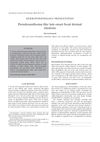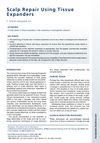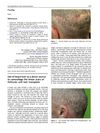 29 citations,
January 2010 in “PubMed”
29 citations,
January 2010 in “PubMed” FUE hair transplants offer minimal scarring and are good for short hairstyles but are time-consuming and can be costly.
 28 citations,
August 2014 in “Journal of Assisted Reproduction and Genetics”
28 citations,
August 2014 in “Journal of Assisted Reproduction and Genetics” The VEGF +405G allele may increase the risk of PCOS in South Indian women.
 28 citations,
July 2013 in “Journal of Craniofacial Surgery”
28 citations,
July 2013 in “Journal of Craniofacial Surgery” Hair follicle transplantation can hide scars but often needs more than one surgery for better results.
 20 citations,
October 2018 in “Clinical Drug Investigation”
20 citations,
October 2018 in “Clinical Drug Investigation” Dutasteride does not impair mental function in elderly men with enlarged prostate.
 20 citations,
January 2005 in “Australasian Journal of Dermatology”
20 citations,
January 2005 in “Australasian Journal of Dermatology” A woman had a skin condition with increased normal elastic fibers, not related to other known disorders, likely due to aging.
 19 citations,
January 2001 in “Dermatology + psychosomatics”
19 citations,
January 2001 in “Dermatology + psychosomatics” The review concluded that male pattern baldness is mostly seen negatively, affecting attractiveness and social appeal.
 16 citations,
March 2020 in “Facial Plastic Surgery Clinics of North America”
16 citations,
March 2020 in “Facial Plastic Surgery Clinics of North America” Platelet-Rich Plasma (PRP), a substance from a patient's own blood, can stimulate hair regrowth in people with Androgenetic Alopecia (AGA) who haven't had success with other treatments, but more research is needed to optimize its use.
 16 citations,
February 2010 in “Facial Plastic Surgery Clinics of North America”
16 citations,
February 2010 in “Facial Plastic Surgery Clinics of North America” Dr. Samuel M. Lam's article concludes that skilled facial fat grafting can effectively restore facial volume and serve as a complement or alternative to traditional face-lifting methods.
 15 citations,
August 2015 in “Scanning”
15 citations,
August 2015 in “Scanning” Corkscrew and cigarette-ash-shaped hairs in tinea capitis are caused by internal hair degradation and external resistance.
 14 citations,
June 2018 in “JAMA Dermatology”
14 citations,
June 2018 in “JAMA Dermatology” Trichoscopy is useful for diagnosing and monitoring hair and scalp conditions over time.
 13 citations,
November 2013 in “The Journal of Dermatology”
13 citations,
November 2013 in “The Journal of Dermatology” Minoxidil 2% lotion is safe and effective for making eyebrows thicker and fuller.
 12 citations,
July 2016 in “Atlas of the Oral and Maxillofacial Surgery Clinics”
12 citations,
July 2016 in “Atlas of the Oral and Maxillofacial Surgery Clinics” The document concludes that the endoscopic brow lift is a less invasive cosmetic surgery that requires careful technique and patient selection to achieve lasting, aesthetically pleasing results.
 12 citations,
May 1989 in “Postgraduate Medicine”
12 citations,
May 1989 in “Postgraduate Medicine” The document concludes that hair loss is common and can be treated with medications like minoxidil or surgical options, and it significantly affects people's psychological well-being.
 11 citations,
August 2013 in “Facial Plastic Surgery Clinics of North America”
11 citations,
August 2013 in “Facial Plastic Surgery Clinics of North America” Tissue expanders effectively repair large scalp defects and restore a natural-looking scalp.
 10 citations,
January 2015 in “Skin appendage disorders”
10 citations,
January 2015 in “Skin appendage disorders” Low-cost videomicroscopes are not as reliable as standard videodermatoscopes for scalp examination due to lower image quality.
 10 citations,
May 2012 in “Journal of Plastic Reconstructive and Aesthetic Surgery”
10 citations,
May 2012 in “Journal of Plastic Reconstructive and Aesthetic Surgery” Beard hair can effectively hide hair transplant scars.
 10 citations,
November 1997 in “British Journal of Dermatology”
10 citations,
November 1997 in “British Journal of Dermatology” A 10-year-old boy had the earliest reported case of hair that became progressively kinkier but eventually returned to normal on its own.
 9 citations,
February 2018 in “Forensic Science International”
9 citations,
February 2018 in “Forensic Science International” The study could not confirm if Victor Vinnetou was Mbuyisa Makhubu and suggested more evidence, like DNA tests, is needed.
 9 citations,
August 1952 in “The Journal of Clinical Endocrinology & Metabolism”
9 citations,
August 1952 in “The Journal of Clinical Endocrinology & Metabolism” A 17-year-old female with adrenogenital syndrome produces very high levels of androgens, which prevent complete feminization despite high estrogen doses.
 7 citations,
October 2019 in “Klinická onkologie”
7 citations,
October 2019 in “Klinická onkologie” Cancer treatments often cause hair loss and damage, affecting patients' mental health.
 7 citations,
June 2004 in “Dermatologic Surgery”
7 citations,
June 2004 in “Dermatologic Surgery” A new hair transplant method combines individual and group follicles for better results and efficiency.
 7 citations,
November 2000 in “Clinics in Dermatology”
7 citations,
November 2000 in “Clinics in Dermatology” Most hair loss in children is caused by a few common conditions and is easy to diagnose, but rare types require careful evaluation.
 7 citations,
July 1975 in “Acta dermato-venereologica”
7 citations,
July 1975 in “Acta dermato-venereologica” A patient with Rothmund-Thomson syndrome showed skin changes, hair loss, and dental defects but no cataracts or skeletal issues.
 6 citations,
February 2016 in “American Journal of Dermatopathology”
6 citations,
February 2016 in “American Journal of Dermatopathology” The boy with woolly hair nevus had thinner hair and abnormal hair follicles, which improved with treatment but worsened when treatment stopped.
 6 citations,
January 2016 in “Skin appendage disorders”
6 citations,
January 2016 in “Skin appendage disorders” A man with rare Lichen Planopilaris lost body hair, not scalp hair, and treatment stopped itching but didn't regrow hair.
 6 citations,
May 2012 in “Archives of Dermatological Research”
6 citations,
May 2012 in “Archives of Dermatological Research” A new mutation in the HR gene is linked to a rare form of hair loss with limb deformities.
 5 citations,
March 2021 in “International Journal of Dermatology”
5 citations,
March 2021 in “International Journal of Dermatology” Biotin supplementation during isotretinoin treatment for acne may help maintain skin hydration and improve hair growth.
 4 citations,
January 2016 in “Acta dermatovenerologica Alpina, Pannonica et Adriatica (Tiskana izd.)”
4 citations,
January 2016 in “Acta dermatovenerologica Alpina, Pannonica et Adriatica (Tiskana izd.)” 5% minoxidil foam is a safe, effective treatment for male pattern hair loss, with increased hair count and few side effects.
 4 citations,
March 2012 in “InTech eBooks”
4 citations,
March 2012 in “InTech eBooks” Tree leaves and lichens can effectively indicate air pollution levels in cities.
 4 citations,
January 2008 in “Facial Plastic Surgery”
4 citations,
January 2008 in “Facial Plastic Surgery” Improve skin paddle appearance after head and neck reconstruction using tissue expansion, rearrangement, and flaps.






























